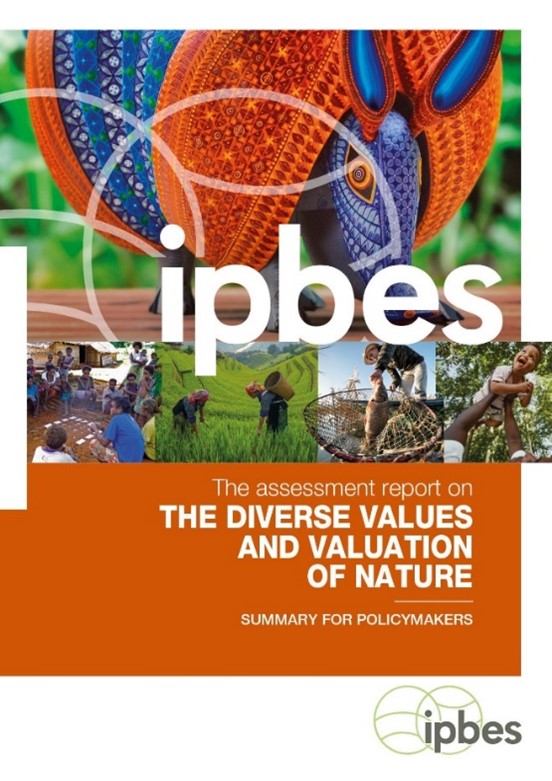The IPBES summary report for policy-makers was released on July 11, 2022, and includes an excerpt from NWMO contributors.
Scientists from the Nuclear Waste Management Organization (NWMO) contributed to a cross-disciplinary report on the many different ways people conceive and value nature and how those values can help inform public policy and decision-making.
The Intergovernmental Science-Policy Platform on Biodiversity and Ecosystem Services (IPBES) assessment report on the diverse values and valuation of nature (known as the “Values Assessment”) found that the way nature is valued in political and economic decisions has been a driver of the global biodiversity crisis. But it is also a vital opportunity for addressing the problem.
IPBES is an independent intergovernmental body comprising 139 member Governments. Established by Governments in 2012, it provides policy-makers with objective scientific assessments about the state of knowledge regarding the planet’s biodiversity, ecosystems and the contributions they make to people, as well as the tools and methods to protect and sustainably use these vital natural assets. The Values Assessment report is the product of four years of research by 82 leading experts from a wide variety of backgrounds and relevant fields, representing 47 countries around the world.
The NWMO’s Melissa Mayhew, Senior Environmental Scientist, and Jessica Perritt, former Section Manager for Indigenous Knowledge and Reconciliation, were invited to contribute a submission to the IPBES Values Assessment. Their contribution was highlighted as a real-world example of decision-making that fosters sustainability by following interrelated values-centred guidelines in planning for the deep geological repository that will safely store Canada’s used nuclear fuel. Their submission was featured in the summary for policy-makers released on July 11, 2022, with the full contribution to appear in the report’s final chapter later this year.
“As an Indigenous woman, I was honoured to contribute to this important international study to amplify the sophistication of Indigenous Knowledge systems and the importance for Indigenous voice. Collectively, we need to understand that in order to elevate the quality of work and organizations, we have to make space for multiple ways of knowing in order to co-create more effective solutions to protect Mother Earth,” said Ms. Perritt, who is currently on leave from her position at the NWMO and working with the Turtle Island Institute. “Successfully implementing Indigenous Knowledge systems into large environmental infrastructure projects requires, first and foremost, that western scientists make shifts to ensure that outcomes are grounded in relationship, respect and reciprocity between the human and non-human species.”
The IPBES report notes that recognizing and respecting the traditional knowledge of Indigenous peoples allow policies to be more inclusive of how different people live, relate to and value nature, which translates into better outcomes for people and nature.
The NWMO was one of the first organizations in North America to implement an Indigenous Knowledge Policy (2020). The policy commits the NWMO to include diverse values in all areas of the NWMO’s work and decision-making processes, and that Indigenous Knowledge will be respected and protected in its application. As part of that commitment, the NWMO hosts an annual workshop that brings together Indigenous Knowledge Keepers and western scientists to explore topics on which both worldviews can bring valuable insight.
“Institutions and policies rarely take into account the full diversity of worldviews and values in relation to the natural environment, which can contribute to reduced wellness for people and the planet,” added Ms. Mayhew. “That is why the NWMO has adopted a collaborative process. Working at the community level and with local Indigenous Knowledge Keepers is critical for the success of our work to protect people and the environment. We hope that sharing our experience as part of the IPBES Values Assessment can inspire others to bring greater diversity in perspectives to infrastructure projects that will benefit the natural environment.”
The NWMO has committed to only proceeding with the deep geological repository at a site that is safe and has informed and willing hosts, and is on track to select a preferred site.
About the NWMO
The Nuclear Waste Management Organization (NWMO) is a not-for-profit organization tasked with the safe, long-term management of Canada’s used nuclear fuel inside a deep geological repository, in a manner that protects people and the environment for generations to come.
Founded in 2002, the NWMO has been guided for 20 years by a dedicated team of world-class scientists, engineers and Indigenous Knowledge Keepers that are developing innovative and collaborative solutions for nuclear waste management. Canada’s plan will only proceed in an area with informed and willing hosts, where the municipality, First Nation and Métis communities, and others in the area are working together to implement it. The NWMO plans to select a site in 2023, and two areas remain in our site selection process: the Wabigoon Lake Ojibway Nation-Ignace area in northwestern Ontario and the Saugeen Ojibway Nation-South Bruce area in southern Ontario.

